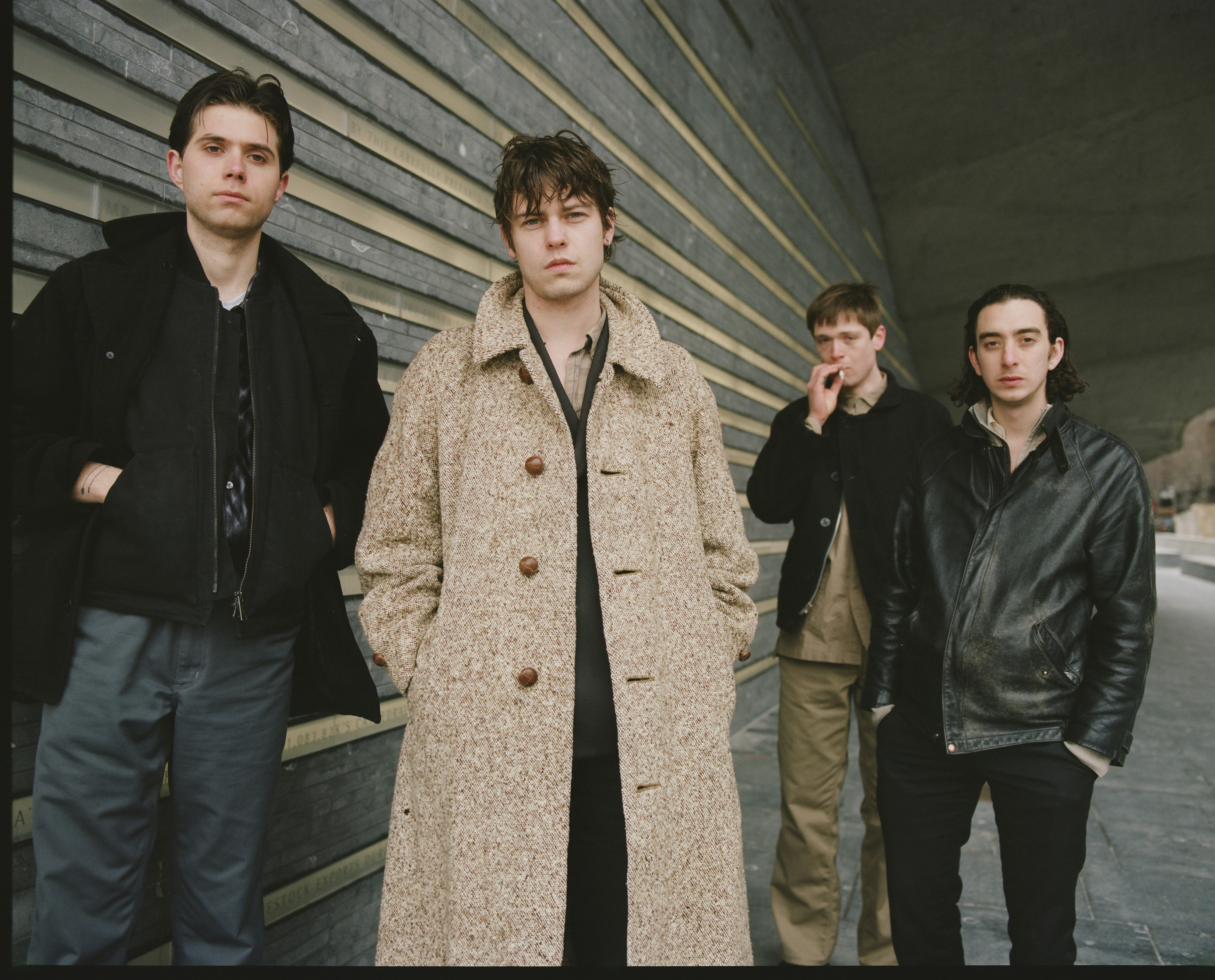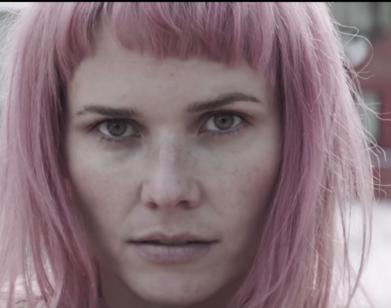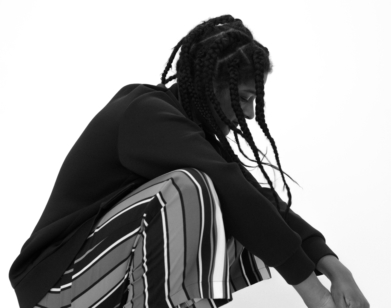Danish rockers Iceage move beyond their punk past
Led by the enigmatic Elias Bender Rønnenfelt—along with guitarist Jakob Tvilling Pless, bass player Johan Surrballe Wieth, and drummer Dan Kjær Nielsen—Danish four-piece Iceage burst out of Copenhagen’s post-punk scene with their 2011 debut, New Brigade, and have since built up an aura of nihilistic swagger. The band calls both Richard Hell and Iggy Pop vocal fans, and as they continued to garner acclaim with the riotous You’re Nothing [2013] and the enthralling Plowing Into the Field of Love [2015], the group expanded on their atmosphere of seductive despair.
On their latest release, Beyondless (out May 4), Iceage trades the raw energy of their earlier releases for a more polished sound, further experimenting with punk, glam, and country while retaining that intoxicating blend of dark romanticism and existential angst.
Rønnenfelt’s lyrics are often verbose (“Perfumed like a common whore bargaining for scant amounts / Complacent with the faults in our blazing stars”), delivered in a cathartic moan. In person, however, he’s cool and withdrawn, as though wary of sullying the band’s work with unnecessary chatter. Though the band seemed reserved when I first sat down with the quartet at Matador Records’ headquarters in New York’s Lower East Side, it didn’t take long for them to thaw out, as we discussed everything from writer’s block to octopus DNA.
ANNIE MURNIGHAN: I read that you guys hated New York the first time that you came. Has that changed at all?
ALL: Yeah…
ELIAS BENDER RØNNENFELT: We didn’t wholly hate it, we just hated parts of what was coming at us. The music industry, and that sort of thing.
MURNIGHAN: Beyondless was the first album you recorded entirely analog. How did that affect the writing and recording process?
RØNNENFELT: Yeah, the first we did completely [analog]. Mostly just because there was a good tape machine in the studio we were at.
PLESS: We didn’t decide before; we didn’t pick out the studio for that sake. It’s just that the guy had those tape machines and they sounded great, so.
RØNNENFELT: But we always, with every record, use tape at some point in the process, because if music never leaves the computer it just doesn’t have a lot of depth in the sound. We didn’t want some sort of nostalgic element to the sound, it’s simply because it sounds good.
MURNIGHAN: After New Brigade you said you’ve “never really been a band that was stating anything, you’re only raising questions.” I wonder if you still feel that to be true.
RØNNENFELT: Hm … Nah. I don’t think we want to give direct answers, but it’s sort of an abstract message.
MURNIGHAN: That definitely comes through in the way the new songs sound. The sense of urgency and desperation is still there, but they feel more polished or maybe more meticulous in a way. I don’t know how you feel about that.
RØNNENFELT: There’s always been some sort of seasick core to the way we play together where we’re always shifting and moving around like tectonic plates in some strange way. I’ve never heard anybody but us play like that. That core is still present, but it’s an involuntary thing. It’s just how we sound.
MURNIGHAN: Anything you’ve been reading recently?
RØNNENFELT: Dan’s been reading about squids.
NIELSEN: I’m reading this book, it’s very interesting.
MURNIGHAN: Whoa, what is that?
NIELSEN: The Octopus, the Sea, and the Deep Origins of Consciousness. It’s like scientific philosophy, something like that. It’s about how life developed and all the species got their brains. That kind of thing.
RØNNENFELT: You were telling me how the origin of most animals in humanity is a sponge or something?
NIELSEN: Yeah, that’s one of the first creatures. A sponge.
MURNIGHAN: Like, a sea sponge?
NIELSEN: Yeah, I guess one that’s just like, lying there.
ALL: [laughs]
RØNNENFELT: Like SpongeBob.
MURNIGHAN: Wow. SpongeBob as the origin of humanity?
NIELSEN: Exactly.
MURNIGHAN: Do you read a lot of scientific texts?
NIELSEN: Uh, no [laughs] I wouldn’t say so. Never, really.
WIETH: We’d just been talking about squids so much, and then you found it.
NIELSEN: Yeah, I just stumbled upon this book and it sounded really exciting. It’s nice for once to read something that’s not a novel.
RØNNENFELT: I’ve just been rereading a Henry Miller book because I overslept when we had to go to the airport and I had to pack in approximately 15 seconds.
PLESS: The other day at the airport I bought the Gucci Mane autobiography.
MURNIGHAN: How is it?
PLESS: Good so far. I’ve only read a couple of chapters, but we’ll see.
MURNIGHAN: I wanted to talk a little bit about the concept of genre and categorization. After the last record, Elias, you said that part of you wants to be a pop star but you still feel like a rock band in many ways.
RØNNENFELT: I don’t think I was thinking about a whole lot when I said that.
ALL: [Laughs]
RØNNENFELT: I think it just seemed like a cocky thing to say at the time.
WIETH: It’s been a bit of a reoccurring question. People tend to notice that statement.
MURNIGHAN: People also still tend to focus on genre when it comes to your music and trying to place it, but it seems like more and more the idea of genre altogether is becoming irrelevant.
RØNNENFELT: Yeah.
NIELSEN: I’ve always answered that we’re a rock’n’roll band, but now it’s more…
PLESS: I don’t know. I don’t think it’s relevant to have to categorize yourself in that way.
WIETH: It’s not something that’s important to us as a band, nor important to the process of creating music.
RØNNENFELT: We don’t categorize ourselves.
PLESS: That’s not our job.
RØNNENFELT: And we don’t embrace any category that gets thrown our way.
MURNIGHAN: I wonder how you feel about this record now that it’s done and awaiting release. Do you feel like you lived up to your own expectations this time around?
RØNNENFELT: Yeah, I mean it’s hard to say what your own expectations are, but it seems like it ended up as what it was supposed to be. I think it’s very much a body of work in its own right.
WIETH: I would say that about all four records. I think it came out as it was supposed to at the time.
PLESS: I think the expectations that we have are always just to make a record that we’re happy about.
RØNNENFELT: Any growing dissatisfaction with what you do just becomes a springboard to what’s next. So it’s a good thing when you can grow a bit annoyed with it at some point as well.
MURNIGHAN: Did you feel that between Plowing Into the Field of Love and Beyondless?
RØNNENFELT: We were happy with that thing we did last, but then when we wrote something that sounded like it, we became dissatisfied. We don’t wanna repeat ourselves. We had to tap into something that felt like it was bringing something new, pushing itself into something that was a little unknown to us.
MURNIGHAN: Is that a conversation you have when you’re working together, about moving away from what you’ve done in the past?
PLESS: No, I think it’s something that’s unspoken.
RØNNENFELT: Maybe telepathically, but—
PLESS: I think we all felt that and we didn’t have to say it.
NIELSEN: I think we’ve always felt that way.
RØNNENFELT: We never know what we do like or what we’re going for. We just know where we don’t wanna go. You just feel your way out, and it’s not until you’re further into the process that you can take a step back and realize what kind of thing it is that you’re gonna do.
MURNIGHAN: There’s almost a dream-like quality to the new visuals, especially the video you just released for “Catch It.” Can you remember the last dream you had?
PLESS: I remember having a very confusing dream last night, but I can’t remember what it was. I remember waking up being confused and trying to remember.
RØNNENFELT: Yeah, I rarely remember my dreams, and when I do I’m usually pretty disturbed by my subconsciousness [laughs]. But I don’t know if it’s something I’ve ever drawn from in music.
NIELSEN: I think it can be a good place to find elements. Maybe not for us so much.
RØNNENFELT: Things can be dream-like while awake, as well. There’s a lot going on [in the video for “Catch It”], and it’s hard to differentiate what’s happening. The lines are pretty blurred.
NIELSEN: There are different perspectives in that, different points of view.
MURNIGHAN: Do you feel like there’s a through-line that you’re trying to maintain in your work as your sound continues to evolve, something you’re trying to hold on to?
WIETH: I think that no matter what we’re gonna do, you’ll always be able to tell that we did it together. But I don’t think we have any … I think what we have together will naturally be distinct from what other people do.
NIELSEN: I guess us playing is the common red thread.
PLESS: And us playing honestly.
RØNNENFELT: Yeah, it’s a gradual thing, you know? And it’s an ongoing development. So that hopefully will never become stagnant.
WIETH: As you play with someone for eight plus, nine-plus years, obviously you’re gonna learn and learn together. The way we learned how to play music was together.
RØNNENFELT: And I think fortunately it’s something that proves itself to be gradually more and more interesting instead of the other way around.
PLESS: It’s never been boring.
MURNIGHAN: You don’t ever feel stuck?
ALL: No.
ICEAGE’S LATEST RECORD BEYONDLESS (MATADOR RECORDS) IS OUT ON MAY 4th, 2018.







